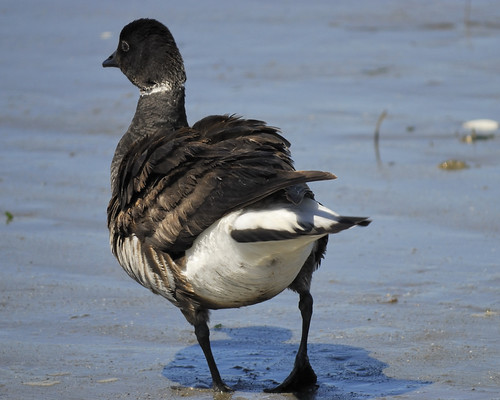tags: Brant Goose, Brent Goose, Brant, Black Brant, Branta bernicla, birds, mystery bird, bird ID quiz
[Mystery bird] Brant Goose, also known as Brant or Brent Goose, and, on the west coast as the Black Brant, Branta bernicla nigricans, photographed in Moss Landing, California. [I will identify this bird for you in 48 hours]
Image: Joseph Kennedy, 6 May 2010 [larger view].
Nikon D200, Kowa 883 telescope with TSN-PZ camera eyepiece 1/640s f/8.0 at 1000.0mm iso400.
Please name at least one field mark that supports your identification.
This lovely bird is found all along the west coast, on saltwater, rarely on fresh water and is never seen far away from the sea.


Well, there are a very few records for these handsome birdsin Arizona, Grrl Scientist, but they'd definitely lost their way. Not much eelgrass hereabouts.
I once saw a flock of these on the east end of Lake Erie -- pretty impressive sighting, or so I thought. Turns out that there's a migratory corridor for them that runs from James Bay across Lake Erie to the Chesapeake area.
They also show up every few years along Lake Michigan or elsewhere in Illinois.
psweet: aren't the ones you saw a different subspecies?
Looking at the color and the white necklace I think I know this one...we saw them a lot when we lived up north ( Maryland) and went to Chincoteague...However I am not good on sub-species!
But I have a bone to pick grrlscientist...I looked back at the bird feet and they are not identified! They fascinated me and I would love to know what they are! Thank you...I was so surprised and happy to stumble across these science blogs!
No problem regarding species*, since I regularly see these in winter, sometimes feeding on the rocks at the end of the road, but which race? Is this bernicla or nigricans? Going by the location I opt for the latter.
*Or former species, since they may have been split.
joan: sorry about that, but it's finished now (and i am rather proud of it, too). thanks for the kick in the pants about the birdie feet, i need it!
This looks like the belly is whitish rather than blck. Would this make it "hrota", Pale-bellied subspecies?
Grrl -- yes, the Lake Erie birds are bernicla. The only one I've ever seen in Illinois was actually a nigricans -- atlhough that was apparently quite unusual.
Adrian -- I haven't got a bird quide up here at the moment, but I believe that the dark area on nigricans is actually the abdomen, thus in front of the legs. The white around the vent is consistent across all of them, I think. And there does appear to be a dark smudge just at the front of the part we can see.